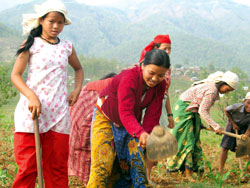|
|
Young Magar women sing love songs as they plant maize in this remote corner of Nawalparasi. In Dhaubari VDC Newari schoolgirls sit by the road laughing and talking. Bahun women tend cows. A little up the road, Chhetri boys flirt with teenage Gurung farmers.
It is hard to believe this idyllic multi-ethnic setting in the plains of central Nepal was till two weeks ago a battlefield. The sound of bombs and gunfire rent the air and army helicopter hovered overhead menacingly.
"I do not fear the dark anymore and my mother has stopped crying whenever she sees me alive," says Khem Bahadur Rana, a young community volunteer. The end of fighting has made Rana's three hour roundtrip on foot for a literacy program for Magar women much easier.
For Humkala Sapkota, the past two weeks have been an answer to her prayers for peace. "It's so soothing to hear people sing again, chat about their crops, their cows and newborn babies," she tells us, "now we don't have to fear any maobadi or shahi sena." Indeed, Nepalis who were caught between the Maoists and the RNA have heaved a collective sigh of relief. The joy is most palpable in places like Nawalparasi which were at the frontline of the conflict with chronic vigilante attacks, disappearances and human rights violations by both sides.
Given the way past ceasefires turned out, there is still some skepticism among villagers, but they already see tangible changes. "The civil servants have returned and they feel safe even in areas where the Maoists were," says Rajendra Debkota, secretary of the Benimanipur VDC. He was the first government staff to be abducted by the rebels two years ago and the rebels he meets these days tell him to let bygones be bygones even promising to return his property that they seized.
Local communities are not waiting for the parliament in Kathmandu to get its act together so they have formed committees to begin local development work. Some have even dashed off formal requests for funds through their VDCs for irrigation, women's literacy work and child support programs. "Earlier, we were not sure about setting up savings groups because of the fear that the money would be stolen by the Maoists, the vigilantes or by the army," says a local female community worker.
Another big relief has been the disbanding of anti-Maoist vigilante groups who walked with guns in the villages and intimidated farmers with extortion and looting. A week ago, the most notorious groups led by Muna Khan, Murari Kuswaha and Nasir Ali surrendered arms provided by the security force to the local Maoist leaders.
"Now my friends and I are thinking about joining the Maoists but not until we are sure their ceasefire will last longer than before," says 19-year old Sugrim Rajbhar who was on his way to attend a Maoist rally in Parasi. Villagers were taken in 50 buses to the venue along the Mahendra Highway shouting pro-Maoist slogans. At checkpoints, the RNA and APF armed with machine guns watched quietly and let the buses pass.
Many farmers, traders, students sat down under tents listening to the Maoist leader. Confused and nervous, many were afraid the meeting may be attacked by the army. Birendra Chaudhary scoured the horizon for signs of approaching helicopters. "You can't blame us for being worried, we are always the ones caught in the middle," says Chaudhary.
Maoists were going around shaking hands and assuring everyone that there was no need to be afraid. "There will be no betrayal on our part," said Comrade Saurab, "it now depends on the parties." But among the local traders and farmers, there is still serious concern about Maoist extortion. "I just wish they stopped asking for taxes," says a villager from Ramgoran. The rebels here have stopped asking for 'donations', now it's called an annual tax and it is usually worth half the value of their property.
Despite this, most villagers reason it is a price they have to pay for peace and have come to terms with it. Schools have re-opened after nearly two months, parents are no longer afraid that their children will be caught up in a firefight, or forcibly recruited. Residents near here have still not forgotten how two young women Asmita Chapagain and Paru Biswakarma were killed by roadside bomb left by Maoists in February (See: 'Daughter slaughter', #286) .
"My father doesn't have to come to school anymore to fetch me home, there is peace now," says 11-year old Santosh Shrestha as he heads off to his Sri Dipendra Secondary School 83 km from Butwal.
"Our war is not over"
The leader of the Maoists in Nawalparasi, Comrade Akash spoke to Nepali Times near the district's army barrack from where RNA soldiers watched him with undisguised curiosity.
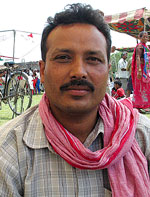 Nepali Times: Your leaders have been sending messages from India that they are optimistic about joining the mainstream politics.
Nepali Times: Your leaders have been sending messages from India that they are optimistic about joining the mainstream politics. Comrade Akash: We have the same optimism at the local level that there is every possibility for us to join open politics. But the government has to be more transparent and consistent. There are signs that the parties are more sincere but there are doubts. Our main concern is that the Royal Nepal Army is still loyal to the king. We hope that the power of the people will change this.
How about your soldiers. Are the soldiers willing to come under the people? The People's Liberation Army is a political army with one ideology and it will respect the decision of the party which speaks for the people.
Will peace last this time?
We don't want a dead peace but a peaceful political resolution.
Now it is all up to the seven-party government and how it will make that possible. The process for peace talks, formation of interim government and constituent assembly can make the peace last longer. Ceasefire will not be broken from our part because our demands are very clear and consistent.
So you are still skeptical about the parties.
We are not expecting changes overnight but the parties need to make their political decisions fast. The king and his sycophants are waiting for them to trip and start making the mistakes of the past.
The parties have to be very cautious and vigilant about the royalists of the old regime.
Despite the ceasefire, people are complaining that your extortion has not stopped.
Extortion or donation terror are absolutely wrong words to define people's contribution to our cause. We are merely collecting taxes for the war fund. Our party has no choice but to collect taxes from especially the business community who can afford to contribute a small portion of their income. You have to realise that this is merely a ceasefire and that our war is not over yet.
"We need more traffic jams"
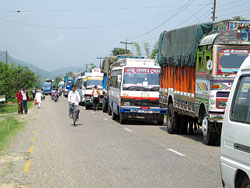 It no longer takes the best part of a week to cross Nepal by bus. Mankamana is three hours by car from Kathmandu again. The roads are smooth and the only sign of the conflict are the rusted hulks of burnt trucks and blasted cars by the roadside. Security at checkpoints is more relaxed, soldiers no longer harass bus passengers and force them to walk a km with their luggage.
It no longer takes the best part of a week to cross Nepal by bus. Mankamana is three hours by car from Kathmandu again. The roads are smooth and the only sign of the conflict are the rusted hulks of burnt trucks and blasted cars by the roadside. Security at checkpoints is more relaxed, soldiers no longer harass bus passengers and force them to walk a km with their luggage.
"I couldn't believe I could reach here in just four hours," says Bimal Chhetri of Chitwan who was able to make it to a relative's wedding from Kathmandu. The only reason for delays nowadays are traffic jams caused by thousands of buses, trucks and private cars as people become mobile again.
But Ram Sharma who runs a restaurant in Mugling isn't complaining: "We need more traffic jams. That is sign of life coming back to normal." Mugling's famous eateries are now back in business, doing most of their turnover at night when the night buses crisscross this junction.
"The business is picking up gradually and there is no space during the weekends," says Suresh Maharjan from the Riverside Resort. There are no more booby-trapped obstacles along the way. Soldiers stand by the road but wave everyone through. The police sit in their posts and only note the number plates.
"This is just routine to register the number plates in case any criminal activities take place," says a police constable near Chitwan. There is no more curfews or Maoist blockades. The only danger now is the rising number of accidents. "We have to teach these drivers a lesson and this time we have to be stricter than the police," says a local resident who was leading a six-hour road blockade near Chitwan highway after a child was killed by a microbus.
WEB EXCLUSIVE | PHOTO GALLERY
ALL PICS: NARESH NEWAR
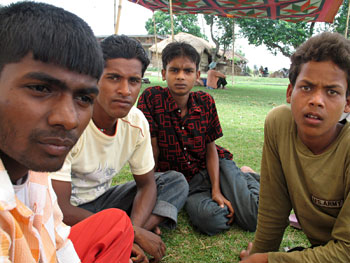
The role of Nepali youth in politics is significantly growing. The Maoists, parties and the royalists have always been competing to recruit them. These youth have shown keen interest to join the rebels.
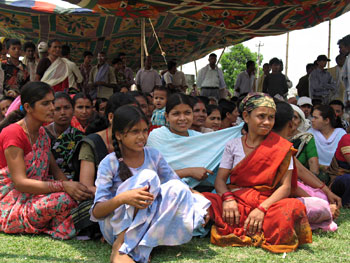
Maoists have been organising assemblies all over the country on a daily basis to renew their relationship with the Nepali mass.
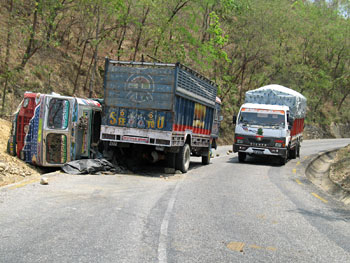
The highways outside the capital have returned to normal but the dangers of road accidents are also increasing due to the recklessness of public vehicle drivers.
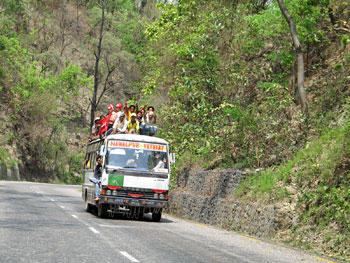
The ceasefire has allowed Maoist supporters to move openly without any fear of the security forces.

These roads in Mahendra highway between Nawalparasi and Rupendehi once considered most dangerous due to the roadblocks are now safe, as the explosives have been removed.
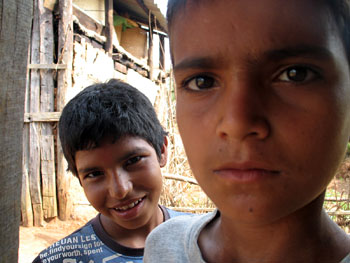
Children have started going to school without any fear of being abducted by the rebels or harassed by the security forces.
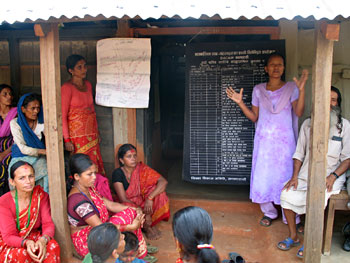
Community development activities have resumed and are running smoothly since the end of king's direct rule and declaration of ceasefire.

